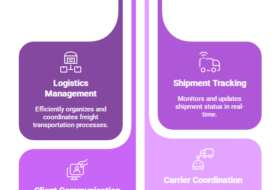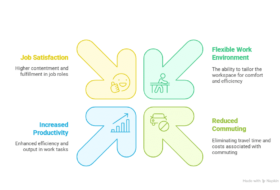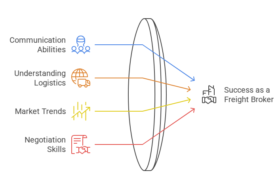Introduction: As the logistics industry continues to thrive, the demand for skilled freight brokers is on the rise. Freight brokers play a crucial role in the trucking industry, connecting shippers with carriers and ensuring the efficient movement of goods. If you’re considering a career as a freight broker for trucking, this guide will walk you through the essential steps and provide valuable insights to help you succeed.
1. Understanding the Role of a Freight Broker: Freight brokers act as intermediaries between shippers who need to transport goods and carriers who can move those goods. Their responsibilities include negotiating rates, arranging transportation, handling documentation, and ensuring timely delivery. Effective freight brokers possess strong negotiation skills, industry knowledge, and the ability to manage relationships with various stakeholders.
2. Benefits of Becoming a Freight Broker:
- Flexibility: Freight brokers often enjoy flexible work schedules and the ability to work from home or a remote location.
- Lucrative Earnings: Successful freight brokers can earn a substantial income through commissions and fees.
- Industry Growth: The trucking industry continues to grow, increasing the demand for freight brokers who can facilitate efficient transportation.
3. Steps to Become a Freight Broker:
Step 1: Gain Industry Knowledge and Experience While formal education is not always required, having a background in logistics, transportation, or business can be beneficial. Consider gaining experience in related fields, such as working for a shipping company, trucking company, or logistics provider.
Step 2: Complete a Freight Broker Training Program Enroll in a reputable freight broker training program to gain comprehensive knowledge of the industry. These programs cover essential topics such as:
- Industry regulations and compliance
- Load negotiation and pricing strategies
- Customer relationship management
- Transportation management systems
Step 3: Obtain Your Freight Broker License To operate legally as a freight broker, you must obtain a freight broker license from the Federal Motor Carrier Safety Administration (FMCSA). The licensing process involves:
- Registering your business with the FMCSA
- Obtaining a USDOT number
- Submitting an application (OP-1 form) to the FMCSA
- Securing a surety bond or trust fund agreement (minimum $75,000)
Step 4: Get Insurance Acquire the necessary insurance to protect your business, such as contingent cargo insurance and general liability insurance. These policies provide financial protection in case of damage, loss, or legal issues.
Step 5: Set Up Your Business Operations Establish your business operations by setting up an office, acquiring the necessary technology (such as transportation management software), and developing a marketing strategy to attract clients.
Step 6: Build Relationships and Network Networking is crucial in the freight brokerage industry. Build relationships with shippers, carriers, and other industry professionals. Attend industry events, join professional associations, and leverage online platforms to expand your network.
4. Tips for Success as a Freight Broker:
- Stay Informed: Keep up with industry trends, regulations, and market conditions to provide the best service to your clients.
- Develop Strong Negotiation Skills: Effective negotiation is key to securing profitable deals and building lasting relationships.
- Provide Excellent Customer Service: Ensure timely communication, transparency, and reliability to build trust with clients and carriers.
- Utilize Technology: Invest in transportation management software and other tools to streamline operations and improve efficiency.
FAQs:
- What educational background is required to become a freight broker? While formal education is not mandatory, a background in logistics, transportation, or business can be advantageous.
- How long does it take to become a licensed freight broker? The timeline varies, but obtaining a license typically takes a few weeks to a few months, depending on the completion of training, application processing, and securing a surety bond.
- What is the cost of becoming a freight broker? Costs include training program fees, licensing fees (around $300 for the FMCSA application), and the surety bond (minimum $75,000 bond).
- Can I work as a freight broker from home? Yes, many freight brokers operate their businesses from home, leveraging technology to manage operations remotely.
Conclusion: Becoming a freight broker for trucking offers a rewarding career with significant earning potential and flexibility. By gaining industry knowledge, completing a training program, obtaining your license, and building a strong network, you can establish a successful freight brokerage business. Stay informed, develop your skills, and provide excellent service to thrive in this dynamic industry.
Growth + Change = Opportunity! How are you going to capitalize on the opportunity as a freight broker, agent, dispatcher or box truck carrier?
Enroll in a course today and get a Shippers List for free! Use Code: freeship








